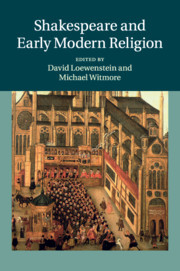Description
Shakespeare and Early Modern Religion
Coordinators: Loewenstein David, Witmore Michael
This volume freshly illuminates the diversity of early modern religious beliefs, practices and issues, and their representation in Shakespeare's plays.
Language: English
Shakespeare and Early Modern Religion
Publication date: 10-2018
Support: Print on demand
Publication date: 10-2018
Support: Print on demand
Shakespeare and Early Modern Religion
Publication date: 01-2015
Support: Print on demand
Publication date: 01-2015
Support: Print on demand
Description
/li>Contents
/li>Biography
/li>
Written by an international team of literary scholars and historians, this collaborative volume illuminates the diversity of early modern religious beliefs and practices in Shakespeare's England, and considers how religious culture is imaginatively reanimated in Shakespeare's plays. Fourteen new essays explore the creative ways Shakespeare engaged with the multifaceted dimensions of Protestantism, Catholicism, non-Christian religions including Judaism and Islam, and secular perspectives, considering plays such as Hamlet, Julius Caesar, King John, King Lear, Macbeth, Measure for Measure, A Midsummer Night's Dream and The Winter's Tale. The collection is of great interest to readers of Shakespeare studies, early modern literature, religious studies, and early modern history.
Introduction David Loewenstein and Michael Witmore; Part I. Revisiting Religious Contexts in Shakespeare's England: 1. The debate about Shakespeare and religion David Bevington; 2. Choosing sides and talking religion in Shakespeare's England Peter Marshall; 3. Experiencing religion in London: diversity and choice in Shakespeare's metropolis Felicity Heal; Part II. Representing Religious Beliefs and Diversity in the Plays: 4. Delusion in A Midsummer Night's Dream Alison Shell; 5. The siege of Jerusalem and subversive rhetoric in King John Beatrice Groves; 6. Shakespeare's Julius Caesar and the search for a usable (Christian?) past Peter Lake; 7. Lucretius, Calvin, and natural law in Measure for Measure Adrian Streete; 8. Agnostic Shakespeare?: the God-less world of King Lear David Loewenstein; 9. 'Another Golgotha' Ewan Fernie; 10. Shakespeare and wisdom literature Michael Witmore; 11. Awakening faith in The Winter's Tale Richard McCoy; 12. Hamlet, Henry VIII, and the question of religion: a post-secular perspective Paul Stevens; 13. Converting Henry: truth, history, and historical faith in Henry VIII Michael Davies; 14. Shakespeare's non-Christian religions Matthew Dimmock; Afterword Brian Cummings.
David Loewenstein is Edwin Erle Sparks Professor of English and the Humanities at Pennsylvania State University. He is the editor and author of many publications, including John Milton, Prose: Major Writings on Liberty, Politics, Religion, and Education (2013), Treacherous Faith: The Specter of Heresy in Early Modern English Literature and Culture (2013), The Cambridge History of Early Modern English Literature (coeditor, Cambridge, 2002), and Representing Revolution in Milton and his Contemporaries: Religion, Politics, and Polemics in Radical Puritanism (Cambridge, 2001) which won a James Holly Hanford Distinguished Book Award.
Michael Witmore is Director of the Folger Shakespeare Library in Washington, DC. He is the author of Landscapes of the Passing Strange: Reflections from Shakespeare (with Rosamond Purcell, 2010), Shakespearean Metaphysics (2008), and Pretty Creatures: Children and Fiction in the English Renaissance (2007). He is also the editor of Childhood and Children's Books in Early Modern Europe, 1550–1800 (with Andrea Immel, 2006).
Michael Witmore is Director of the Folger Shakespeare Library in Washington, DC. He is the author of Landscapes of the Passing Strange: Reflections from Shakespeare (with Rosamond Purcell, 2010), Shakespearean Metaphysics (2008), and Pretty Creatures: Children and Fiction in the English Renaissance (2007). He is also the editor of Childhood and Children's Books in Early Modern Europe, 1550–1800 (with Andrea Immel, 2006).
© 2024 LAVOISIER S.A.S.
These books may interest you

Shakespeare and the Natural World 106.56 €




